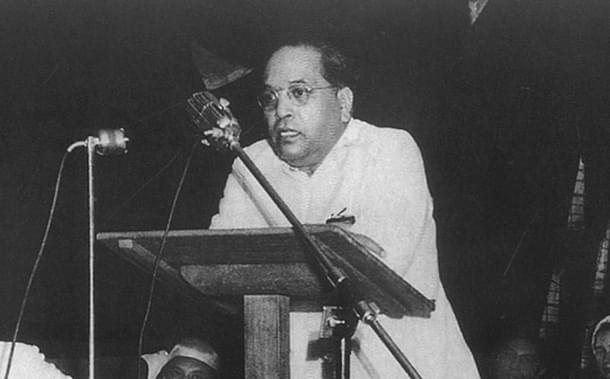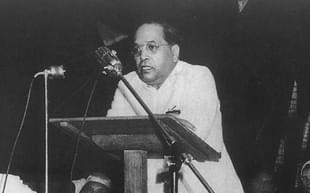Books
Five Excerpts From Ambedkar’s Historic ‘Grammar of Anarchy’ Speech
Swarajya Staff
Apr 14, 2016, 01:21 PM | Updated 01:21 PM IST
Save & read from anywhere!
Bookmark stories for easy access on any device or the Swarajya app.


On 25 November 1949, a day before the Constitution was formally adopted by the Constituent Assembly, BR Ambedkar rose in the central hall of the Parliament and almost in a prophetic tone delivered a speech which is described as amongst the greatest speeches made in the Indian Parliament. This oration, where Ambedkar reflects on the Indian Constitution, it’s context, nature and possibilities related to it, is now referred to as the ‘Grammar of Anarchy’ speech. While the speech deserves to be read in full, here are five important excerpts from it which reflect the scholarship, observation and vision of Ambedkar.
1. How Good is the Constitution?
Ambedkar did not believe that just because he was the chairman of the drafting committee, the committee had come up with a Constitution that would be noble and all-powerful for all time to come. Even after producing a document like the Indian constitution, Ambedkar was clear that it was only an instrument in the hands of the people. An instrument by itself is not bad or good, useful or worthless. It is what one does with it that matters.
Much in the same way, Ambedkar believed that howsoever good a constitution may be, what mattered in the end was what kind of people put it into practice and how they did it.
“As much defence as could be offered to the constitution has been offered by my friends Sir Alladi Krishnaswami Ayyar and Mr.. T.T. Krishnamachari. I shall not therefore enter into the merits of the Constitution. Because I feel, however good a Constitution may be, it is sure to turn out bad because those who are called to work it, happen to be a bad lot. However bad a Constitution may be, it may turn out to be good if those who are called to work it, happen to be a good lot. The working of a Constitution does not depend wholly upon the nature of the Constitution. The Constitution can provide only the organs of State such as the Legislature, the Executive and the Judiciary. The factors on which the working of those organs of the State depend are the people and the political parties they will set up as their instruments to carry out their wishes and their politics. . . If they adopt the revolutionary methods, however good the Constitution may be, it requires no prophet to say that it will fail. It is, therefore, futile to pass any judgement upon the Constitution without reference to the part which the people and their parties are likely to play.”
2. On Communists and Socialists
In this section of the speech, Ambedkar takes to task the Communists and the Socialists for their contrived and malicious opposition to the newly-created Constitution. Best to get to the quote straight away here:
“The condemnation of the Constitution largely comes from two quarters, the Communist Party and the Socialist Party. Why do they condemn the Constitution? Is it because it is really a bad Constitution? I venture to say ‘no’. The Communist Party want a Constitution based upon the principle of the Dictatorship of the Proletariat. They condemn the Constitution because it is based upon parliamentary democracy. The Socialists want two things. The first thing they want is that if they come in power, the Constitution must give them the freedom to nationalize or socialize all private property without payment of compensation. The second thing that the Socialists want is that the Fundamental Rights mentioned in the Constitution must be absolute and without any limitations so that if their Party fails to come into power, they would have the unfettered freedom not merely to criticize, but also to overthrow the State.”
3. The Admission of Fallibility
Is ignorance of one’s greatness a final proof of it? Is an admission of fallibility a stamp of wisdom?
Ambedkar, on part of his generation, was willing to concede what most people will never—that a later generation might want to do things differently and that they would and should have every right to do so.
This concession becomes all the more important when it is looked in its temporal context. India was a newly independent, divided and poor country. At the time, the only thing that could be said with certainty about India’s future was that it was uncertain. Secondly, the Constituent Assembly was comprised of many accomplished men and women. Given the uncertainty of the times and the credentials of the Constituent Assembly, it would have been very easy for Ambedkar to accord an infallibility to the Constitution produced by such a group.
However, he was willing to grant the future generation of Indians as much right to govern themselves in the way they wanted as he accorded to his own.
“The Assembly has not only refrained from putting a seal of finality and infallibility upon this Constitution as in Canada or by making the amendment of the Constitution subject to the fulfilment of extraordinary terms and conditions as in America or Australia, but has provided a most facile procedure for amending the Constitution. I challenge any of the critics of the Constitution to prove that any Constituent Assembly anywhere in the world has, in the circumstances in which this country finds itself, provided such a facile procedure for the amendment of the Constitution. If those who are dissatisfied with the Constitution have only to obtain a 2/3 majority and if they cannot obtain even a two-thirds majority in the parliament elected on adult franchise in their favour, their dissatisfaction with the Constitution cannot be deemed to be shared by the general public.”
4. The Greater Threat Lies Within
At the dawn of the Indian republic, Ambedkar was worried that an old tragedy might strike again—the failure of some Indians to think beyond their or their community’s interest. He quoted examples from India’s history to prove that his fears weren’t unfounded, that rather than an external power, what India had to be most wary of, were its own internal divisions.
“It is not that India was never an independent country. The point is that she once lost the independence she had. Will she lose it a second time? It is this thought which makes me most anxious for the future. What perturbs me greatly is the fact that not only India has once before lost her independence, but she lost it by the infidelity and treachery of some of her own people. In the invasion of Sind by Mahommed-Bin-Kasim, the military commanders of King Dahar accepted bribes from the agents of Mahommed-Bin-Kasim and refused to fight on the side of their King. It was Jaichand who invited Mahommed Gohri to invade India and fight against Prithvi Raj and promised him the help of himself and the Solanki Kings. When Shivaji was fighting for the liberation of Hindus, the other Maratha noblemen and the Rajput Kings were fighting the battle on the side of Moghul Emperors. When the British were trying to destroy the Sikh Rulers, Gulab Singh, their principal commander sat silent and did not help to save the Sikh Kingdom. In 1857, when a large part of India had declared a war of independence against the British, the Sikhs stood and watched the event as silent spectators.
Will history repeat itself? It is this thought which fills me with anxiety. This anxiety is deepened by the realization of the fact that in addition to our old enemies in the form of castes and creeds we are going to have many political parties with diverse and opposing political creeds. Will Indian place the country above their creed or will they place creed above country? I do not know. But this much is certain that if the parties place creed above country, our independence will be put in jeopardy a second time and probably be lost for ever. This eventuality we must all resolutely guard against. We must be determined to defend our independence with the last drop of our blood.(Cheers)“
5. On the ‘Grammar of Anarchy’
The preservation of democracy in any new state is contingent upon its political and social stability. This is not to say that the state shouldn’t have competing political or social groups, but that the conflicts among them are sought to be resolved within the framework of the constitution. So while there can be massive upheaval at the micro-level, there is continuity and stability at a macro-level.
All political parties in India, by virtue of operating within the ambit of constitution, accord a right to be in government to all other parties. Imagine if this were not the case. What would happen? What would happen if say the BSP opposed SP’s rule in UP, only because it is the SP.
The BSP would try to create a popular movement against the the Samajawadi Party. If it succeeds, it would throw the state into turmoil. And who is to say the SP would not do the same once it finds itself out of power?
That this is not the case in India is a matter of great relief, especially so when one looks around in India’s neighbourhood in south Asia.
Even if inadvertently, Indian political parties seem to have heeded Ambedkar’s advice to forsake unconstitutional methods to achieve their objectives. As a result, even the most bitter political conflicts today in India are sought to be resolved within the limits of the Constitution.
“If we wish to maintain democracy not merely in form, but also in fact, what must we do? The first thing in my judgement we must do is to hold fast to constitutional methods of achieving our social and economic objectives. It means we must abandon the bloody methods of revolution. It means that we must abandon the method of civil disobedience, non-cooperation and satyagraha. When there was no way left for constitutional methods for achieving economic and social objectives, there was a great deal of justification for unconstitutional methods. But where constitutional methods are open, there can be no justification for these unconstitutional methods. These methods are nothing but the Grammar of Anarchy and the sooner they are abandoned, the better for us.”





